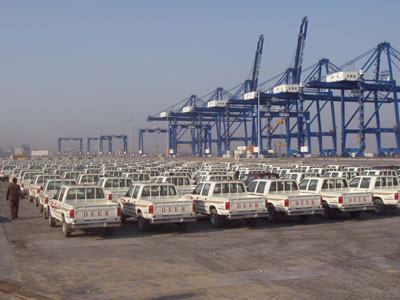China is drifting away from overreliance on cheap,
low-end goods to more value-added products, reported the Financial Times Monday.
The booming country witnessed a 30 to 150 per cent rise in the exports of
telecommunications equipment, auto parts, software and ships since 2005, a
Deutsche Bank report was cited as saying, while the low-end exports are
running out of steam.

Vehicles wait to be exported to Saudi Arabia
in a port in Tianjin in this file photo.
[newsphoto] |
In the first 11 months of last year, China exported 12,000 more vehilces than
import, statistics showed.
"Across a wide range of machinery and industrial intermediate goods, China is
now a net exporter," Arthur Kroeber of Dragonomics, a consultancy in
Beijing was quoted.
The change of exports composition indicated that China is getting more
competitive in industries where it could hardly match the developed
countries in the 1990s.
The transformation was attributed to three factors: rising wages which have
pushed some low-end manufactures offshore, increased policy support for high-end
products and growing private sector.
"Private enterprises have been growing much faster than state enterprises,
and many of the private firms have moved quickly into the high-end products to
capture the market and profit margins," said Jun Ma, chief China economist for
Deutsche Bank.
The bank estimates high-end exports will grow for 30-40 per cent a year for
the next three to five years with some sectors, such as auto parts and software
outsourcing.
China expects its sales overseas of software to grow to US$12.5 billion from
US$3.59 billion in 2005, according to an industry blueprint for 2006-2010.
The high-end goods, with less market share in the global market, have more
space to grow, whereas cheap traditional exports, such as toys, where China
already has 80 per cent share of US imports, have run out of steam, the FT
report said.
The report summed up China's advantages for developing its newer industris:
cheap labor, low production cost, including cheaper land and steel and less
pressure to account for the real cost of environmental
destruction.